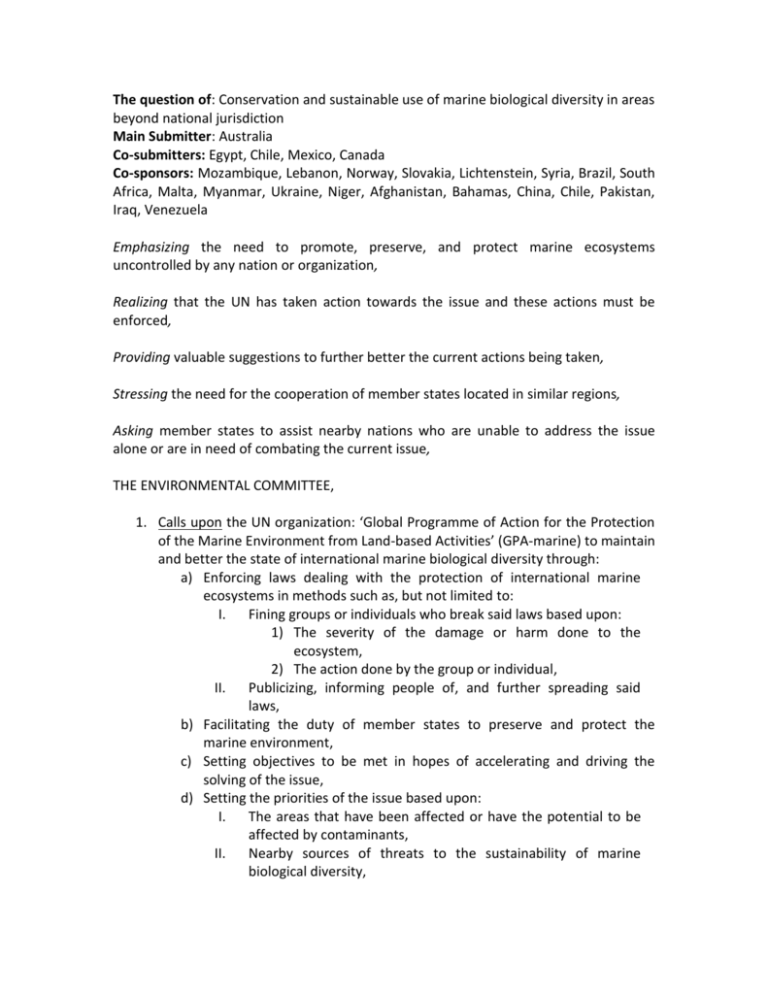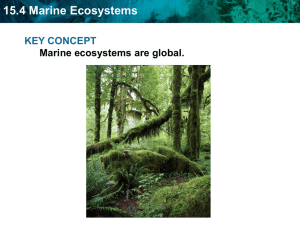Locals 2011 Resolution - Australia
advertisement

The question of: Conservation and sustainable use of marine biological diversity in areas beyond national jurisdiction Main Submitter: Australia Co-submitters: Egypt, Chile, Mexico, Canada Co-sponsors: Mozambique, Lebanon, Norway, Slovakia, Lichtenstein, Syria, Brazil, South Africa, Malta, Myanmar, Ukraine, Niger, Afghanistan, Bahamas, China, Chile, Pakistan, Iraq, Venezuela Emphasizing the need to promote, preserve, and protect marine ecosystems uncontrolled by any nation or organization, Realizing that the UN has taken action towards the issue and these actions must be enforced, Providing valuable suggestions to further better the current actions being taken, Stressing the need for the cooperation of member states located in similar regions, Asking member states to assist nearby nations who are unable to address the issue alone or are in need of combating the current issue, THE ENVIRONMENTAL COMMITTEE, 1. Calls upon the UN organization: ‘Global Programme of Action for the Protection of the Marine Environment from Land-based Activities’ (GPA-marine) to maintain and better the state of international marine biological diversity through: a) Enforcing laws dealing with the protection of international marine ecosystems in methods such as, but not limited to: I. Fining groups or individuals who break said laws based upon: 1) The severity of the damage or harm done to the ecosystem, 2) The action done by the group or individual, II. Publicizing, informing people of, and further spreading said laws, b) Facilitating the duty of member states to preserve and protect the marine environment, c) Setting objectives to be met in hopes of accelerating and driving the solving of the issue, d) Setting the priorities of the issue based upon: I. The areas that have been affected or have the potential to be affected by contaminants, II. Nearby sources of threats to the sustainability of marine biological diversity, III. The vulnerability of areas to contaminants and other external powers; 2. Emphasizes the need for the UN to impose restrictions on the use of international waters through implementing regulations such as, but not limited to: a) Completely forbidding the use of the sea as an area to dispose of waste by imposing heavy fines on member nations or other corporations found throwing hazardous waste into international waters, b) Encouraging member nations to strictly enforce the ban on the use of destructive fishing methods such as over catching, trawling, dynamite and cyanide fishing, c) Enforcing an annual limit (Individual fishing quota), in metric tons, on the amount of endangered marine species fished by each country so as to: I. Maintain equilibrium in marine food chains, II. Allow member nations to use vital, but endangered resources in a responsible manner III. Give ample time for marine resources to replenish naturally, IV. UN forces will be deployed in order to regulate the fishing and amount of vessels entering international waters; 3. Asks for the complete support from the United Nations to GPA-marine through: a) The establishment of a voluntary fund whose profits will be used by GPA-marine to carry out any task that may help alleviate the issue such as, but not limited to: I. Conducting valuable research and/or experiments directly related to solving the current issue, II. Sending funds to member nations which will allow them to: 1) Create farms for specific endangered, indigenous fish which will allow the fish population to grow, easing the effects of overfishing, 2) Create landlocked enclosures within the nation in order to fish without further aggravating the depletion of fish, 3) Spend time on the production of another type of foodstuff to take the place of the fish, b) Allowing GPA-marine to indict people of breaking international law for doing things such as, but not limited to: I. Illegal dumping of harmful contaminants or pollutants in nongovernment controlled waters, II. Whaling or Hunting and killing any other endangered marine species, III. Not following the guidelines stated in clause 2, c) Providing GPA-marine with the resources to research and learn more about the current issue; 4. Calls upon the UN Division for Sustainable Development (DSD) to identify and locate specific causes of water pollution in specific bodies of water through: a) Collecting water samples from areas of convenience and if found, areas where obvious contamination has occurred, these samples will be tested for any harmful external contaminants, b) Tracing the groups responsible for polluting through: I. The investigation of nearby potential polluters, II. Tracing where harmful external contaminants as mentioned in clause 4a. came from; 5. Calls for the establishment of an Ad Hoc conference between Marine Biological Diversity specialists, relative NGO’s, and governments who wish to support the issue which will: a) Expand our knowledge on the current issue, b) Allow key players to stay in communication and therefore, together; 6. Encourages member states of similar location to cooperate and communicate in order to maintain peace within nearby marine ecosystems through methods such as, but not limited to: a) The establishment of agreements between countries of the same region or who share specific bodies of water such as the ‘Helsinki Convention on the Protection and Use of Trans Boundary Watercourses and International Lakes’ specific to the Baltic sea that sets guidelines to travelling on the waters and allows them to more easily manage the waters between them, b) Assisting nearby less economically developed nations (LEDC’s) in eradicating themselves of the current issue through: I. Granting nearby LEDC’s with funding, II. Deploying forces to assist that nation in any task related to the issue; 7. Requests that member nations ensure the environmental integrity of businesses registered in their country but operating in international waters by: a) Removing any subsidies from private corporations which have vessels allocated to fish or mine from the sea, b) Encouraging corporations to take initiative in saving marine life by: I. Granting tax reductions to businesses who shift to sustainable methods of fishing or mining in the sea, II. Increasing import and export taxes on goods that originate from the ocean, c) Immediately revoking the license of any corporation found in violation of the provisions set forth in clause 2.







